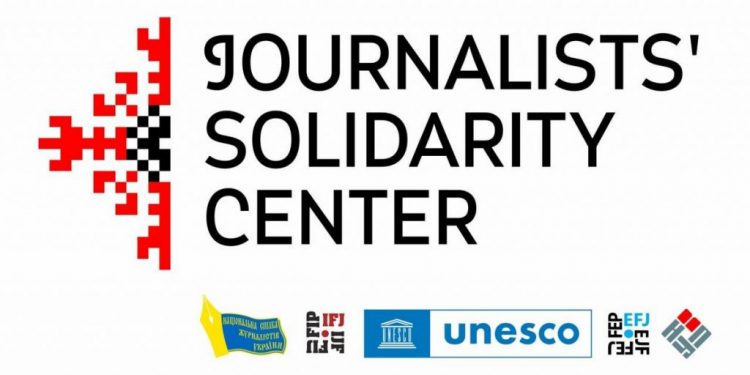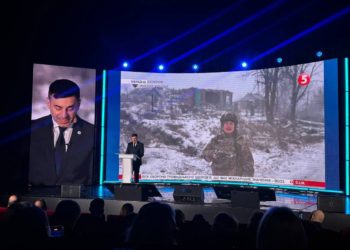The priority needs of the media outlets and media workers and the assistance to colleagues became the main topics of the specialized meeting held in the Ivano-Frankivsk Journalists’ Solidarity Center (JSC) of the National Union of Journalists of Ukraine (NUJU) with representatives of the regions it is responsible for. The President of the NUJU, Sergiy Tomilenko, and its First Secretary, Lina Kushch, also took part in the meeting.
In addition to the Ivano-Frankivsk Region, the zone of responsibility of the Ivano-Frankivsk JSC of the NUJU covers Chernihiv, Volyn, Kherson, and Rivne Regions.
Sergiy Tomilenko noted that the main goal of NUJU‘s assistance with the support of foreign partners is to motivate journalists to stay safe and stay in the profession.
“Particular attention is paid to displaced journalists. It’s aimed at enabling them to move to safe places from occupied territories or territories where hostilities are taking place and continue their media activities. This is one of the key tasks of the NUJU’s JSCs. In order to support the journalists, we gave them laptops, power banks, etc., at the request of each region. Now, we are ready to receive new requests,” Sergiy Tomilenko noted.
Lina Kushch noted that there are six main areas in which you can count on help from NUJU‘s international partner organizations for media professionals and media outlets.
In particular, those are:
- safety of media workers in the combat zone, provision of protective equipment, consultations on accreditation of the Armed Forces of Ukraine (AFU);
- journalists in the occupied territories: monitoring of persecution of media persons, communication support, consultations on ways to leave the occupation, etc.
- assistance to journalists who need a workplace for media activities: currently, JSCs work as co-working spaces, equipped with the necessary equipment that can be used by colleagues;
- training: the JSC network conducts various trainings, webinars, and master classes that will help media professionals improve their knowledge and skills and acquire new ones in order to be competitive in the profession;
- legal assistance: there is now a legal hotline where media workers can get advice in various fields of law;
- psychological assistance: there is currently quite a lot of demand for it, so various psychological training webinars are held and aimed at strengthening the resilience of media workers.
Lina Kushch also emphasized the great importance of the communication component with the media people who received help from the NUJU. It is important for donor organizations to know how the aid provided to journalists has benefited them, as well as to understand what Ukrainian media workers who have suffered from a full-scale war urgently need.
“We must show the conditions under which journalists currently work; we must present the stories of Ukrainian media workers who left dangerous territories, or stayed to work there, and what kind of help they need… Covering these issues helps attract funds from foreign partners to help our colleagues more effectively,” noted Lina Kushch.
According to Viktoriya Plakhta, the coordinator of the Ivano-Frankivsk JSC, communication with the media and the leadership of NUJU‘s regional Centers takes place on a permanent basis.
“We have been communicating with Chernihiv and Rivne Regions since the JSC was created, and the regions were attached to it, and Kherson and Volyn Regions recently joined. We are constantly in touch, there is a mutual understanding. In addition to communication in Google Forms, we often communicate in person, on the phone because I prefer live communication, during which you can inquire about matters in more detail, argue, and convince each other of something. Now, colleagues have informed about their urgent needs,” said Viktoriya Plakhta.
During the meeting, most of its participants – the heads of the NUJU regional organizations – drew attention to the fact that the displaced journalists urgently need equipment for work. Those media workers who remained in dangerous territories need basic monetary and food assistance.
In particular, the head of the Kherson regional organization of the NUJU, Valerii Dolyna, noted that before the full-scale invasion, there were 320 journalists, a significant number of whom have now found refuge in safer regions of Ukraine and abroad. However, now the number of members of the Union in the Kherson Region has decreased: eight people were expelled from the ranks of the Union for collaboration with the enemy, and ten people have been killed… Fifty NUJU members are currently staying in Kherson; they continue their professional activities in the city, which is constantly under fire. In total, 10-15 members of the community need financial assistance.
“But our people do not lose faith in Victory,” noted Valerii Dolyna.
The head of the Rivne regional organization of the NUJU, Dmytro Tarasiuk, spoke about the problem that has prevented normal work for a long time – it was the struggle for the premises, which the regional branch of the Union has occupied since 1992, and from which the authorities decided to “oust” the media organization. However, this is not the only example in Rivne when journalists have to fight for their premises – the 7 Days newspaper has a similar problem.
The heads of the regional organizations themselves are looking for opportunities to help their colleagues who suffered – physically, materially, psychologically – as a result of the full-scale invasion of Ukraine by the Russian Federation. Thus, the secretary of the Volyn regional organization of the NUJU, Olha Kulish, proposed to develop a program of temporary shelter for media workers from dangerous areas, for example, from Kherson, so that they could come at least for a short time to recover.
This idea was supported by her colleague Volodymyr Danyliuk. He also proposed to add Rivne officials, who oust journalists from their premises to the list of enemies of the media.
NUJU Secretary Serhii Shevchenko reminded his colleagues that the Journalists-in-Residence Kosovo assistance program is currently successfully operating, under which journalists who have remained in the profession and speak English at least at a sufficient level can receive a six-month asylum in this country. Currently, there are 1-2 vacancies within the program that media people can use.
The head of the Chernihiv regional organization of the NUJU, Olha Cherniakova, emphasized that the front-line Chernihiv Region receives support from the JSC.
Nataliya Nazarova, the coordinator of the Dnipro JSC, whose zone of responsibility until recently included the Kherson Region, drew attention to the fact that the JSC network works harmoniously.
“There are cases when a displaced journalist registers with a certain JSC and then leaves for another region. So, we advise them to register there to get support. We need to contact the media and tell them who to contact in different areas,” Nataliya Nazarova noted.
“In order for our work to be more effective, for the media to better navigate the life of the Union, in the opportunities offered by the NUJU, a number of information services have been created – a website, a Facebook page, a Telegram channel. We are also represented on other social media networks, and it is worth mentioning them to inform the media. I would like to note that our telegram channel, SPILKA News, is the most efficient. There, the information about current affairs and opportunities for media workers is constantly updated. Therefore, I urge everyone to join our resources, stay up-to-date, and also inform the Union about important events and problems. We have a single large cooperative team with a large collective responsibility aimed at supporting each other. And we are doing everything to make the members of the Union members feel the hand of support,” Sergiy Tomilenko emphasized.
NUJU Information Service

 THE NATIONAL UNION OF
JOURNALISTS OF UKRAINE
THE NATIONAL UNION OF
JOURNALISTS OF UKRAINE
















Discussion about this post